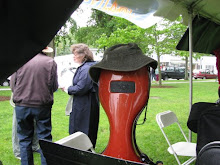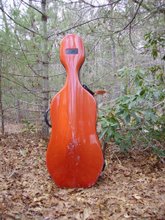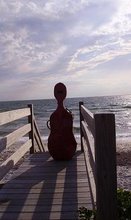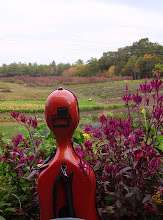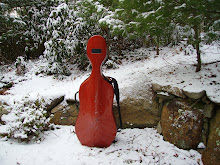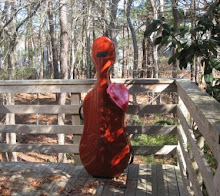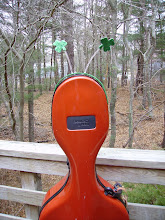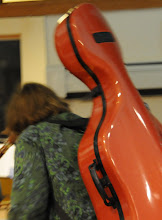Monday, July 6, 2015
SummerKeys!
I'm in Lubec, Maine, at the start of a week of cello lessons, practice, and playing with others. I was here once before, in the summer of 1999, I believe, after I had been playing the cello for about a year. I spent the week trying to perfect "The Happy Farmer," at the end of Suzuki Book 1. My teacher, Peter Levy, grew increasingly frustrated with my inability to get the bowings right. Finally, just before he was about to clobber me, I played it through correctly.
Summerkeys was kind of a lonely experience the first time. I stayed in a motel on Campobello Island, about ten miles from Lubec because someone had recommended Campobello Island. Nearly everyone else was staying in town, within walking distance from the building were lessons were offered and people gathered to practice. Also, most of the other students were much more accomplished than I and I couldn't really relate to what they were working on.
But, it was, all in all, a good experience. So, when my friend Marisa (a fellow lapsed cello blogger) texted me to say she was going up to Lubec this summer and could she stay with us on here way up (it is a two-day drive for her), I said sure, and I'll come with you to SummerKeys too.
We drove up to Lube yesterday from Cape Cod. Including stops, it took about 8 hours. Our motel is very pleasant, two double beds and lots of extra space for two cellos to play, refrigerator, microwave, coffeemaker, and views of sunrise and sunset. It's about 2.5 miles from town, which is not really walking distance with a cello, but feels close, and not at all isolated, like last time.
We met the cello teacher, Joachim Woitun, and most of the other cello students--there are seven of us altogether, plus a lone violinist, a couple of flutes and clarinets, and about 10 classical guitar/classical mandolin students. Most of the cello students seem very accomplished, and most seem to be repeat attenders--a little more frequently than I have attended. I have brought music that I am struggling to play: Faure's Elegy and Scicilienne, and three movements from the first Bach Cello Suite (Prelude, Minuets 1 and 2), but feeling somewhat inadequate about. Hope to make progress this week!
This morning, we have a music lecture and a group cello class, followed by free time, individual practice time, and lessons. There is a group supper tonight.
SummerKeys has grown a lot in the past 15 years. I think lessons and practice were in only one or two buildings back then. This year events are spread out over numerous buildings, churches, and schools.
And this year, Lube has Internet and phone service! Last time I went, my cell phone was useless here.
Time for breakfast!
Saturday, September 1, 2012
One Woman's Trash....
Our lovely mostly finished basement has, over the years, gotten filled with junk, and I am on a mission to get it cleared out and usable again for music and art. When he was in high school, my son used to have his friends over to play music (sometimes a rock band, more often a jazz band). I think it would be a nice place for fiddlers and cellists to gather, and for me to make use of my drafting table (left over from my city planning days).
Some stuff is easy to toss, other stuff, books, records, memorabilia is harder. One item is my old cello case, a big, hulking black case, of molded styrofoam covered with black canvas. I wish I had taken a photo of it before I finally hauled it off to the dump today. The dump has an area called "Pick of the Litter," where you can put usable stuff in hopes that someone will pick it up.
I figured that it was pretty unlikely that anyone would want a massive black cello case, but there are people who lurk around the Pick of the Litter in hopes of finding usable stuff to sell, and I was hoping one of them would think my case valuable enough to sell at a flea market somewhere. I just wanted someone to use it--I hate throwing things out. Thus the state of my basement.
So, I brought the cello case to Pick of the Litter and barely had it out of the car when someone--who barely knew what it was--showed it to a friend of his who happened to be a guitarist who knew a cellist who needed a case. Who would have thought? I left them marveling over the cello case, happy to be one step closer to a litter-free basement.
Some stuff is easy to toss, other stuff, books, records, memorabilia is harder. One item is my old cello case, a big, hulking black case, of molded styrofoam covered with black canvas. I wish I had taken a photo of it before I finally hauled it off to the dump today. The dump has an area called "Pick of the Litter," where you can put usable stuff in hopes that someone will pick it up.
I figured that it was pretty unlikely that anyone would want a massive black cello case, but there are people who lurk around the Pick of the Litter in hopes of finding usable stuff to sell, and I was hoping one of them would think my case valuable enough to sell at a flea market somewhere. I just wanted someone to use it--I hate throwing things out. Thus the state of my basement.
So, I brought the cello case to Pick of the Litter and barely had it out of the car when someone--who barely knew what it was--showed it to a friend of his who happened to be a guitarist who knew a cellist who needed a case. Who would have thought? I left them marveling over the cello case, happy to be one step closer to a litter-free basement.
Fiddling in the Sun
My fiddle group, Ladies' Choice (we are all women--we chose Ladies's Choice because it is the name of a fiddle tune) performed outside at the art market on August 21. We had 10 members playing: three tin whistles, four fiddles, one guitar, one drum, and me, on cello.
I worked hard on these pieces, and felt pretty well prepared for this, but I still couldn't keep up with the fiddlers on a couple of the tunes. Sometimes I wrote simplified versions for myself, which helped, and sometimes I just simplified them on the spot (Notably Pig Ankle Rag). I was worried when a more accomplished fiddler joined us at the last minute and speeded up some of our tunes, but, in the end, all went well.
You will notice that we play from sheet music--that really helps, and enables us to play music with multiple parts. Of the selections below, Ash Grove is a three part version: whistles on one part, fiddles on the second, and me on the third. I love this one because the cello part flows well.
We had prepared an hour and a half of music, but the event was 2.5 hours long. We played through the entire repertoire without a stop, then took a break and started from the beginning again. I taped the tunes we played after the break. (FlipVideo camera on a tripod in the audience--I apologize for the audience noise. The shrieks you hear are kids, not fiddles!)
By the time we started the second set, the sun had shifted and some of the fiddlers and whistlers and the guitarist moved behind me--we had started out in a horseshoe, with me more or less in the middle with the drum and guitar.
Orchestra starts on Wednesday!
I worked hard on these pieces, and felt pretty well prepared for this, but I still couldn't keep up with the fiddlers on a couple of the tunes. Sometimes I wrote simplified versions for myself, which helped, and sometimes I just simplified them on the spot (Notably Pig Ankle Rag). I was worried when a more accomplished fiddler joined us at the last minute and speeded up some of our tunes, but, in the end, all went well.
You will notice that we play from sheet music--that really helps, and enables us to play music with multiple parts. Of the selections below, Ash Grove is a three part version: whistles on one part, fiddles on the second, and me on the third. I love this one because the cello part flows well.
We had prepared an hour and a half of music, but the event was 2.5 hours long. We played through the entire repertoire without a stop, then took a break and started from the beginning again. I taped the tunes we played after the break. (FlipVideo camera on a tripod in the audience--I apologize for the audience noise. The shrieks you hear are kids, not fiddles!)
By the time we started the second set, the sun had shifted and some of the fiddlers and whistlers and the guitarist moved behind me--we had started out in a horseshoe, with me more or less in the middle with the drum and guitar.
Country Waltz/Molly's Waltz
Jamie Allen
Inis Oirr
I'm Gonna Sit Right Down and Write Myself a Letter
Ash Grove
Boda Valsen
Polka Set
Pig Ankle Rag
Orchestra starts on Wednesday!
Monday, July 23, 2012
Fiddling Away the Summer
Every summer I tell myself I will concentrate on fiddle music. Without the weekly orchestra rehearsals (September to early May), I can learn a fiddle tune or two, or even learn to play by ear. And, I love playing outside, with the fiddlers at various events throughout the summer.
And, every summer, the days fly by without my having really focused on fiddle music much at all. This year is no different, especially since I am playing duets with two other cellists (each meeting weekly, most weeks), as well as playing flute in Town Band (10 weekly performances). The women's fiddle group I play in is meeting once a week too, to prepare for our performance at an art fair on August 21. And the larger fiddle group meets and performs regularly, but I have only been to a couple of their sessions.
This year, in preparation for the August 21 performance, I have made an effort to play through all the music a couple of times a week. It should be every day, as I am still struggling with some of the tunes, still rethinking which octave I should be playing in, which fingerings to use. Fiddle music doesn't always translate easily for the cello. Still, I am feeling much better about this music than I have in the past.
The women's group plays from sheet music, so I don't have to deal with the memory/playing by ear issue for this concert, but I am trying to memorize a couple of the tunes--if only because they are easier to play if I really know them.
(I attended a vocal concert yesterday, and talked briefly to another woman afterward. She was so impressed with the singer, not for her singing, which was wonderful, but for her ability to memorize all the show tunes and the little introductory talks before each one, as well as the order of the whole program. I politely agreed with her, but, but for me, it is easier to memorize vocal piece than an instrumental piece. Sometimes putting words to a fiddle tune does help me memorize it. Hmm, maybe I should try that more often.)
There is another cellist in the group now. He plays entirely by ear, and has no problems at all with octaves or fingering. He just plays the tunes, and happily at that. It comes naturally to him, but he also goes to a lot more sessions than I do and no doubt practices more. It's both inspiring and discouraging.
A couple of weeks ago I attended a concert by Jo + Sorcha, a folk music duo consisting of two young women, one playing guitar and banjo, and the other playing cello. The cellist was classically trained, but learned to play by ear. I told her of my inabilities. She told me I could do it. She told me to sit down with a CD and just "bang out" the tune until I got it. She also improvises during performances, too, but of course you have to basically know what you are doing to do that well. She was very encouraging.
One of these days....
And, every summer, the days fly by without my having really focused on fiddle music much at all. This year is no different, especially since I am playing duets with two other cellists (each meeting weekly, most weeks), as well as playing flute in Town Band (10 weekly performances). The women's fiddle group I play in is meeting once a week too, to prepare for our performance at an art fair on August 21. And the larger fiddle group meets and performs regularly, but I have only been to a couple of their sessions.
This year, in preparation for the August 21 performance, I have made an effort to play through all the music a couple of times a week. It should be every day, as I am still struggling with some of the tunes, still rethinking which octave I should be playing in, which fingerings to use. Fiddle music doesn't always translate easily for the cello. Still, I am feeling much better about this music than I have in the past.
The women's group plays from sheet music, so I don't have to deal with the memory/playing by ear issue for this concert, but I am trying to memorize a couple of the tunes--if only because they are easier to play if I really know them.
(I attended a vocal concert yesterday, and talked briefly to another woman afterward. She was so impressed with the singer, not for her singing, which was wonderful, but for her ability to memorize all the show tunes and the little introductory talks before each one, as well as the order of the whole program. I politely agreed with her, but, but for me, it is easier to memorize vocal piece than an instrumental piece. Sometimes putting words to a fiddle tune does help me memorize it. Hmm, maybe I should try that more often.)
There is another cellist in the group now. He plays entirely by ear, and has no problems at all with octaves or fingering. He just plays the tunes, and happily at that. It comes naturally to him, but he also goes to a lot more sessions than I do and no doubt practices more. It's both inspiring and discouraging.
A couple of weeks ago I attended a concert by Jo + Sorcha, a folk music duo consisting of two young women, one playing guitar and banjo, and the other playing cello. The cellist was classically trained, but learned to play by ear. I told her of my inabilities. She told me I could do it. She told me to sit down with a CD and just "bang out" the tune until I got it. She also improvises during performances, too, but of course you have to basically know what you are doing to do that well. She was very encouraging.
One of these days....
Sunday, July 1, 2012
No Adagio for Orchestra
As it turned out, we didn't play Barber's "Adagio for Strings." The general consensus was that we couldn't get it sounding good enough in time for the concert.
While, this was probably true, I was disappointed that we gave up on it. After all, I had spent about 75 percent of my orchestra practice time on it, and I was feeling that it was coming together for me. And when I turned to focus my practicing on the other pieces on the orchestra program, I realized that I still needed to do a lot of work on them. Perhap the difficulty of "Adagio" had masked the lesser, but still real, difficulty of the other pieces.
Our concerts were in May and orchestra is on break until September, when we will start in on Beethoven's Symphony No. 1 and other works. I should be working on it, but I am focusing on fiddle music and playing duets with friends this summer, as well as weekly town band performances (on the flute). There is plenty to work on with this music.
My fiddle group is playing at an outdoor art fair on August 21. It's 2.5 hours of background music, and we have a playlist 27 pieces long. Fortunately we are not playing from memory, but there is still a lot for me to work on here.
More on that later!
While, this was probably true, I was disappointed that we gave up on it. After all, I had spent about 75 percent of my orchestra practice time on it, and I was feeling that it was coming together for me. And when I turned to focus my practicing on the other pieces on the orchestra program, I realized that I still needed to do a lot of work on them. Perhap the difficulty of "Adagio" had masked the lesser, but still real, difficulty of the other pieces.
Our concerts were in May and orchestra is on break until September, when we will start in on Beethoven's Symphony No. 1 and other works. I should be working on it, but I am focusing on fiddle music and playing duets with friends this summer, as well as weekly town band performances (on the flute). There is plenty to work on with this music.
My fiddle group is playing at an outdoor art fair on August 21. It's 2.5 hours of background music, and we have a playlist 27 pieces long. Fortunately we are not playing from memory, but there is still a lot for me to work on here.
More on that later!
Sunday, April 15, 2012
Rebellion
The strings went off to practice "Adagio for Strings" last week, under the direction of the first violinist, rather than the conductor, who was spending the time rehearsing the wind instruments' solo piece, selections from Handel's "Water Music."
The grumbling began right away, the violins taking the lead. Well, there are far more violins than cellos, violas, and bass players. "Adagio for Strings" is a difficult piece, and we are not playing it well. We are having trouble with counting, fingerings, clef-reading, intonation, following the conductor, and staying together. We may simply not be at the level where we can handle this without better coaching. No one even mentioned bowings until last week, when I heard talk of "free bowing" from one of the violinists.
I laughed to myself, thinking it was a joke, but have since found out it is a real term. Wikipedia says it is "a performance technique used by a string section to create a fuller sound than can be achieved by synchronized bowing. Free bowing was popularized by Leopold Stokowski, who as conductor of the Philadelphia Orchestra experimented with many musical conventions....
"Under free bowing...the string members each determine individually the best way to play a set of notes, collectively producing a deeper sound, free of mechanical restriction. Free bowing is rarely used today due to its lack of communal focus, which can cause musicians to play out of step with each other. The Philadelphia Orchestra, with whom it was associated, discontinued the practice after Eugene Ormandy succeeded Stokowski as conductor."
I believe the violinist who suggested free bowing was not looking for a collectively deeper sound, but, rather, to eliminate bowing as one more thing we have to deal with. We are already using free bowing in this context. I don't know if audiences notice these things, but I am guessing our audiences would not. They are a kindly group.
We managed to get through the piece once during our rehearsal, in reasonable order, but no one is confident about their playing. It was suggested that we simply drop the piece from the concert program, rather than play something that will sound, ah, awful.
My immediate response was no, not yet. We still have three more rehearsals. I have spent most of my practice time, such as it is, on this piece! I am almost getting to the point where I can play it, though my consistency of counting in the long note section (whole notes, double whole notes) is still shakey.
The advantage of dropping the piece now is, of course, that it will give us more time to work on the other pieces. The disadvantage is that it could be that with a little more concerted effort we could actually do this. So my vote is to keep trying and drop it at the last minute, if need be.
The grumbling began right away, the violins taking the lead. Well, there are far more violins than cellos, violas, and bass players. "Adagio for Strings" is a difficult piece, and we are not playing it well. We are having trouble with counting, fingerings, clef-reading, intonation, following the conductor, and staying together. We may simply not be at the level where we can handle this without better coaching. No one even mentioned bowings until last week, when I heard talk of "free bowing" from one of the violinists.
I laughed to myself, thinking it was a joke, but have since found out it is a real term. Wikipedia says it is "a performance technique used by a string section to create a fuller sound than can be achieved by synchronized bowing. Free bowing was popularized by Leopold Stokowski, who as conductor of the Philadelphia Orchestra experimented with many musical conventions....
"Under free bowing...the string members each determine individually the best way to play a set of notes, collectively producing a deeper sound, free of mechanical restriction. Free bowing is rarely used today due to its lack of communal focus, which can cause musicians to play out of step with each other. The Philadelphia Orchestra, with whom it was associated, discontinued the practice after Eugene Ormandy succeeded Stokowski as conductor."
I believe the violinist who suggested free bowing was not looking for a collectively deeper sound, but, rather, to eliminate bowing as one more thing we have to deal with. We are already using free bowing in this context. I don't know if audiences notice these things, but I am guessing our audiences would not. They are a kindly group.
We managed to get through the piece once during our rehearsal, in reasonable order, but no one is confident about their playing. It was suggested that we simply drop the piece from the concert program, rather than play something that will sound, ah, awful.
My immediate response was no, not yet. We still have three more rehearsals. I have spent most of my practice time, such as it is, on this piece! I am almost getting to the point where I can play it, though my consistency of counting in the long note section (whole notes, double whole notes) is still shakey.
The advantage of dropping the piece now is, of course, that it will give us more time to work on the other pieces. The disadvantage is that it could be that with a little more concerted effort we could actually do this. So my vote is to keep trying and drop it at the last minute, if need be.
Thursday, April 5, 2012
Choosing or Being Chosen
"Did you choose the cello, or did the cello choose you?"
Not the usual question you expect from your cable guy. I was on the phone with him trying to get some help for our poor television reception. It was the second time in a couple of weeks that we had had a problem, and the first time what seemed to help was unplugging the cable box from one wall outlet and plugging it into another.
This time, my husband noticed when he got home from work that the television was unplugged. When he plugged it back in, the picture was poor, very snowy.
Perhaps because I had had such a fine conversation with the first cable guy, I explained that whole experience to the second cable guy, adding, in an uncharacteristically chatty way, that the television may have gotten unplugged as I stumble out the door with the cello on my back to go to orchestra. "It's a big instrument," I said, and sometimes I bump into things."
And, when I had replugged the cable box and TV, I had left them a little more vulnerable to bumping into.
He could not figure out what was wrong, and finally asked about the cello. He is a pianist, or in his words, plays around on the piano a bit. I never did get his full story on whether he chose the piano or whether it chose him, but I did relate to him some of the results of my daughter's Science Fair project of a few years back.
She was trying to find out if people who chose their own instrument, rather than had one chosen for them, were likely to continue to play longer. The study design was flawed (it included all those people who had to take up the recorder in third grade and dropped it immediately afterward), so I am not sure whether she proved her thesis or not, but one result was very clear: Many people do not choose their instruments.
A very successful saxophonist told us he took it up because there was one in the closet. Sometimes a band director would ask a student to play a particular instrument because the band needed it. Sometimes a mother decides for her children, based on her musical preferences or the logistics of carrying an instrument on the school bus. Or a child gives only superficial consideration: picking the flute because it is shiny or the trumpet because his friend chose the trumpet.
My answer to the cable guy was long-winded. I don't really know if I chose the cello. I was playing flute at the time, but was increasingly annoyed by the high notes. My flute teacher invited her adult students to play with the adult students of a local cello teacher and a violin teacher. I thought the cello really made the flute sound good. Someone gave me the [erroneous] impression that it was easy to play. Soon, I came to love it, even without the flute.
So, I don't really know. Maybe we chose each other.
P.S. The TV issue was not resolved on the phone, so a cable technician was sent to our house. He fixed the problem within 10 seconds of walking in. The television had been manually set to a channel other than 3 (probably when one of us turned off the TV manually; I can't blame this on a careening cello). He switched it back and left--without disclosing his musical inclinations.
Not the usual question you expect from your cable guy. I was on the phone with him trying to get some help for our poor television reception. It was the second time in a couple of weeks that we had had a problem, and the first time what seemed to help was unplugging the cable box from one wall outlet and plugging it into another.
This time, my husband noticed when he got home from work that the television was unplugged. When he plugged it back in, the picture was poor, very snowy.
Perhaps because I had had such a fine conversation with the first cable guy, I explained that whole experience to the second cable guy, adding, in an uncharacteristically chatty way, that the television may have gotten unplugged as I stumble out the door with the cello on my back to go to orchestra. "It's a big instrument," I said, and sometimes I bump into things."
And, when I had replugged the cable box and TV, I had left them a little more vulnerable to bumping into.
He could not figure out what was wrong, and finally asked about the cello. He is a pianist, or in his words, plays around on the piano a bit. I never did get his full story on whether he chose the piano or whether it chose him, but I did relate to him some of the results of my daughter's Science Fair project of a few years back.
She was trying to find out if people who chose their own instrument, rather than had one chosen for them, were likely to continue to play longer. The study design was flawed (it included all those people who had to take up the recorder in third grade and dropped it immediately afterward), so I am not sure whether she proved her thesis or not, but one result was very clear: Many people do not choose their instruments.
A very successful saxophonist told us he took it up because there was one in the closet. Sometimes a band director would ask a student to play a particular instrument because the band needed it. Sometimes a mother decides for her children, based on her musical preferences or the logistics of carrying an instrument on the school bus. Or a child gives only superficial consideration: picking the flute because it is shiny or the trumpet because his friend chose the trumpet.
My answer to the cable guy was long-winded. I don't really know if I chose the cello. I was playing flute at the time, but was increasingly annoyed by the high notes. My flute teacher invited her adult students to play with the adult students of a local cello teacher and a violin teacher. I thought the cello really made the flute sound good. Someone gave me the [erroneous] impression that it was easy to play. Soon, I came to love it, even without the flute.
So, I don't really know. Maybe we chose each other.
P.S. The TV issue was not resolved on the phone, so a cable technician was sent to our house. He fixed the problem within 10 seconds of walking in. The television had been manually set to a channel other than 3 (probably when one of us turned off the TV manually; I can't blame this on a careening cello). He switched it back and left--without disclosing his musical inclinations.
Subscribe to:
Posts (Atom)

